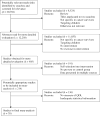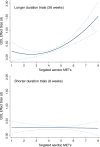Exercise interventions for cancer survivors: a meta-analysis of quality of life outcomes
- PMID: 20931309
- PMCID: PMC3712334
- DOI: 10.1007/s12160-010-9225-1
Exercise interventions for cancer survivors: a meta-analysis of quality of life outcomes
Abstract
Background: Exercise improves quality of life (QOL) in cancer survivors, although characteristics of efficacious exercise interventions for this population have not been identified.
Purpose: The present meta-analysis examines the efficacy of exercise interventions in improving QOL in cancer survivors, as well as features that may moderate such effects.
Method: Studies were identified and coded, and QOL effect sizes were calculated and analyzed for trends.
Results: Overall, exercise interventions increased QOL, but this tendency depended to some extent on exercise and patient features. Although several features were associated with effect sizes, models revealed that interventions were particularly successful if they targeted more intense aerobic exercise and addressed women. These tendencies emerged over longer periods of time and were more prominent in studies with higher methodological quality.
Conclusion: Appropriately designed exercise interventions enhance QOL for cancer survivors and this pattern is especially evident for women. Limitations are discussed.
Conflict of interest statement
Figures


Similar articles
-
Psychological effect of exercise in women with breast cancer receiving adjuvant therapy: what is the optimal dose needed?Ann Oncol. 2013 Feb;24(2):291-300. doi: 10.1093/annonc/mds342. Epub 2012 Oct 5. Ann Oncol. 2013. PMID: 23041586 Review.
-
Home-based exercise improves quality of life in breast and prostate cancer survivors: A meta-analysis.PLoS One. 2023 Apr 20;18(4):e0284427. doi: 10.1371/journal.pone.0284427. eCollection 2023. PLoS One. 2023. PMID: 37079635 Free PMC article.
-
Effects of Exercise Intervention on Quality of Life in Adolescent and Young Adult Cancer Patients and Survivors: A Meta-Analysis.Integr Cancer Ther. 2019 Jan-Dec;18:1534735419895590. doi: 10.1177/1534735419895590. Integr Cancer Ther. 2019. PMID: 31845599 Free PMC article.
-
Home-based multidimensional survivorship programmes for breast cancer survivors.Cochrane Database Syst Rev. 2017 Aug 24;8(8):CD011152. doi: 10.1002/14651858.CD011152.pub2. Cochrane Database Syst Rev. 2017. PMID: 28836379 Free PMC article. Review.
-
Community-based exercise programs for cancer survivors: a scoping review of practice-based evidence.Support Care Cancer. 2019 Dec;27(12):4435-4450. doi: 10.1007/s00520-019-05022-6. Epub 2019 Aug 16. Support Care Cancer. 2019. PMID: 31418074
Cited by
-
Understanding the Experiences of Physical Activity, Body Image, and Quality of Life in Young Adult Males Living with and beyond Cancer.Curr Oncol. 2024 Aug 15;31(8):4675-4684. doi: 10.3390/curroncol31080348. Curr Oncol. 2024. PMID: 39195331 Free PMC article.
-
Associations Between Stress, Health Behaviors, and Quality of Life in Young Couples During the Transition to Survivorship: Protocol for a Measurement Burst Study.JMIR Res Protoc. 2024 Apr 23;13:e53307. doi: 10.2196/53307. JMIR Res Protoc. 2024. PMID: 38652520 Free PMC article.
-
Effects of a peer-led physical activity program on psychosocial outcomes among breast cancer survivors.Psychooncology. 2024 Jan;33(1):e6292. doi: 10.1002/pon.6292. Psychooncology. 2024. PMID: 38282225 Clinical Trial.
-
Survivorship wellness: a multidisciplinary group program for cancer survivors.Support Care Cancer. 2023 Oct 26;31(12):655. doi: 10.1007/s00520-023-08117-3. Support Care Cancer. 2023. PMID: 37882860 Free PMC article.
-
Depressive symptoms and physical activity among young adult survivors of childhood cancer.Psychooncology. 2023 Oct;32(10):1598-1605. doi: 10.1002/pon.6211. Epub 2023 Sep 8. Psychooncology. 2023. PMID: 37684727 Free PMC article.
References
-
- Jemal A, Clegg LX, Ward E. Annual report to the nation on the status of cancer, 1875–2001, with a special feature regarding survival. Cancer. 2004;101:3–27. - PubMed
-
- Jemal A, Siegel R, Ward E, Murray T, Xu J, Thun, MJ Cancer statistics, 2007. CA Cancer J Clin. 2007;57:43–66. - PubMed
-
- de Jong N, Courtens AM, Au-Saad HH, Schouten, HC Fatigue in patients with breast cancer receiving adjuvant chemotherapy: A review of the literature. Cancer Nurs. 2002;25:283–297. - PubMed
-
- Cella DF, Tulsky DS. Quality of life in cancer: Definition, purpose, and method of measurement. Cancer Invest. 2009;11:327–336. - PubMed
-
- Victorson D, Barocas J, Song J, Cella D. Reliability across studies from the functional assessment of cancer therapy-general (FACT-G) Qual Life Res. 2008;17:1137–1146. - PubMed


